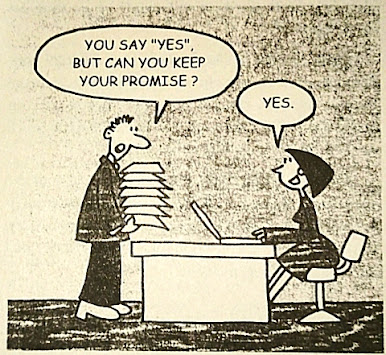HOW TO BRING OUT THE BEST IN PUPPETS
BRING OUT THE BEST IN YES PERSON:
Yes People have a strong people focus and a weak task focus. They are extremely disorganized and frequently overcommit themselves as they try to run their lives based on the desires of other people. Sometimes they don't know how to follow through on something they've agreed to do; more often than not, they don't think about the consequences of what they're agreeing to do.
Yes People feel terrible when they can't deliver something they've promised. Yet they rarely feel responsible, because they can always find circumstances beyond their control that have caused the trouble. Your goal with the Yes Person is to get commitments you can count on. Here are five steps to bringing out the best in the Yes Person.
Make it safe to be honest. Through nonverbal blending and verbal reassurance, make sure your communication environment is safe, so that you and your Yes Person can honestly examine whether he or she will keep promises. As the person becomes more comfortable with you, his or her true thoughts and feelings will surface more easily.
Talk honestly. If you think the Yes Person is angry or resentful about something or believes the excuses he or she is spinning, talk it out. Hear the person out without contradicting, jumping to conclusions, or taking offense. Acknowledge him or her for being honest.
Help them learn to plan. Once you've listened to your Yes Person's point of view, it will be obvious to you why the person can't deliver on his or her commitments. This is the time to create a learning opportunity. Teaching your Yes Person simple task-management skills is a better use of your energy than getting upset at the person when he or she can't deliver!
Ensure commitment. Thank your Yes Person for communicating openly with you and ask how he or she will approach the situation differently next time.
In future projects, make sure the Yes Person is committed at the beginning. Have him or her summarize the project to demonstrate an understanding of what's involved. Write the commitment down. You may even come up with memorable deadlines to ensure that the timeframe will stick. Finally, be sure to describe the negative consequences should your Yes Person fail to deliver. Strengthen the relationship. Look at every interaction as a chance to strengthen the relationship. Make an event out of every completed commitment and see mistakes and broken promises as an opportunity to help the Yes Person develop his or her skills.
Don't place blame: Blaming the Yes Person will simply make him or her ashamed, the behavior will continue as the person promises you anything she thinks will placate you.
Be patient: Recognize that your Yes Person is lacking organizational skills and is unable to recognize or fix this without help. Once you've helped the Yes Person develop task skills, his or her helpful nature will make that person the best teammate you could hope for
Help with task management: Ask the Yes Persón to explain the basics of the project, the tasks involved, and any negative consequences if he or she doesn't meet the commitment. Then, help him or her plan toward the deadlines, to establish a timeframe.
"To please people and avoid confrontations, Yes People say 'Yes' without thinking things through. They react to the latest demands on their time by forgetting prior commitments and over- commit until they have no time for themselves. Then they become resentful."


.jpeg)

Comments
Post a Comment